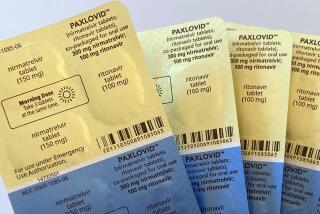FDA Rejects Wider Tests of AIDS Drug
The U.S. Food and Drug Administration has rejected a request by a California pharmaceutical company to expand trials of its experimental AIDS drug, Ribavirin, because there is insufficient evidence that the drug benefits patients, it was announced Wednesday.
The FDA action is a severe setback to plans by ICN Pharmaceuticals Inc. of Costa Mesa to make Ribavirin available to large numbers of people infected with the AIDS virus but who have not yet developed severe symptoms.
In January, the company hailed the anti-viral drug as a major advance in the fight against AIDS at an unusual Washington press conference designed to prod the government into quick approval of the drug. But after reviewing the company’s data, federal officials were not convinced.
“The evidence they submitted was not sufficient in our opinion to justify (wider testing),” said Brad Stone, an FDA spokesman.
The agency has put the application on “clinical hold” until better evidence is submitted, he said.
Widespread Use
So far, the FDA has only made AZT, one of the dozens of AIDS drugs tested in recent years, available for widespread use. Tests have shown that AZT, azidothymidine, which was approved by the FDA last month after an expedited review process, may be effective in prolonging the lives of some AIDS patients with a serious lung infection called pneumocystis. The medical community is anxiously awaiting evidence that additional drugs might also be effective in combatting the AIDS epidemic.
The FDA decision comes at a time when it was learned that a separate ICN-sponsored trial of Ribavirin for patients with the AIDS-related complex had also produced disappointing results.
The 197 patients in the follow-up study appeared to be neither helped nor harmed by taking the medicine for six months, and a “small number” developed AIDS or died, according to a knowledgeable physician. The preliminary results of the study have been known for two months, but the data is still being analyzed by researchers and the company, he said. The results have not been announced.
Dr. Weldon Jolley, an ICN spokesman, declined to comment on the second study, saying that the company was submitting more data to the FDA to persuade the regulatory agency to change its mind about additional testing of Ribavirin. The drug company “got clobbered” by negative publicity after the January press conference, Jolley said.
The announcement of the FDA decision sent the stock price of the relatively small drug company plummeting on the New York Stock Exchange. The stock, on heavy trading of 2.8 million shares, fell 3 5/8 to 11 1/8 a share. Because of wide speculation that Ribavirin would prove effective as an AIDS treatment, ICN stock has traded as high as $34 a share during the last year.
At the Washington press conference, ICN presented preliminary results of a study of 163 homosexual men infected with the acquired immune deficiency syndrome virus. All of the patients felt well but had enlarged lymph nodes and severe immune-system abnormalities.
The company claimed that Ribavirin delayed the onset of AIDS for at least seven months in many of these patients who received it, compared to patients given placebos.
But the study left many leading AIDS researchers unconvinced, because of questions about the analysis of the data, as well as the company’s unusual tactic of announcing its results at a press conference.
Changes Ordered
The company has in the past made unsubstantiated statements about Ribavirin, which is marketed in more than 25 countries, including Mexico. Last year, for example the FDA ordered changes in advertising material about its use to treat a lung infection in infants because of “grossly exaggerated” claims about its effectiveness.
AIDS researchers had mixed reactions to the FDA decision and the reports of the second negative study.
“This is an example of a responsive system,” said Dr. Paul Volberding, the chief AIDS physician at San Francisco General Hospital. “There are dangers if the system responds to non-scientific pressures. In this case, the FDA apparently was not convinced by the data.”
But Ribavirin’s effectiveness was defended by Dr. Peter Heseltine of County-USC Medical Center, a principal investigator in the ICN-sponsored trials that were discussed at the Washington press conference.
“The study we performed stands on its own merits,” Heseltine said. “I still feel the beneficial effects we saw are drug related.”
Additional Data
Heseltine said he will present additional data to support the validity of the study at a meeting of the American Federation of Clinical Research in San Diego on May 2.
ICN officials hoped that the second Ribavirin study, involving patients with the AIDS-related complex, would help convince the medical community that its drug was effective.
Instead, the six-month study reportedly showed that taking Ribavirin pills made little difference in patients’ health. There was no “statistically significant difference” between the patients who received either of two doses of the drug tested and those who were given placebo pills, the source said.
Some patients in all of the three groups developed AIDS or died, the source said, adding that “the drug does appear to be safe.” He said the patients are expected to be informed of the results soon and given the option of whether they want to continue to take the medicine.
The six-month study was conducted at six medical centers throughout the country, including San Francisco General and the University of California, San Diego, Medical Center.






